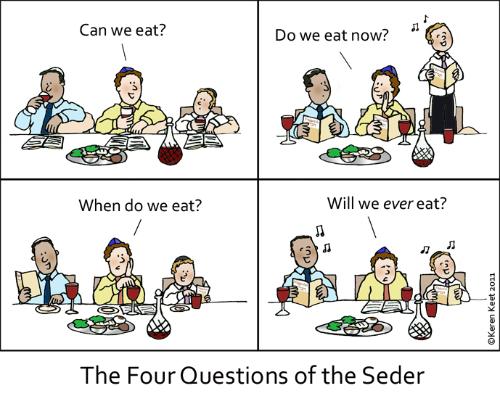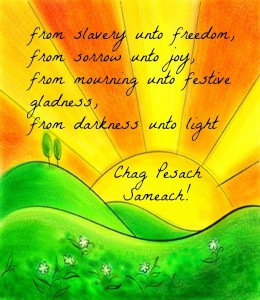[First posted in 2014; a transitional time for Sinaites when we determined which of the 7 Feasts in Leviticus 23 truly apply to non-Israelites, Gentiles like ourselves. The decision to discontinue celebrations that were in the experience of Israel alone and not applicable to us came after the writing of this post. Still, there is much to learn so read on. Know however, that Sinaites observe only the following: weekly Shabbat, Shavuot (giving of the Torah), Yom Kippur (Day of Atonement). We have articles explaining why and how we’ve arrived at this decision. Please refer to the SiteMap.—Admin1]
—————————–
Passover or Pesach is celebrated on different dates every year; for year 2018 it begins March 30 and ends April 7. Jewry will celebrate it as they should, as they are commanded to, since it memorializes their freedom from bondage to Egypt. There are years when the Christian Easter and the Jewish Passover coincide and this year, it’s a week apart.
As our title asks, do Sinaites celebrate Passover?
Pesach or the Passover feast is one of the seven listed as ‘My feasts” in Leviticus 23. Whose ‘feasts’? “My” refers to the Speaker,
- the God Who liberated Israel from Egyptian bondage,
- Who revealed His Name to them through Moses as YHWH, and
- Who is now giving specific instructions and guidelines to His chosen people during their wilderness wandering.
As Christians and Messianics, we Sinaites have celebrated this feast for almost three decades now. We were first introduced to it not by a Jew or a rabbi, but by our Christian Bible teacher whose focus was on correcting misconceptions and wrong teachings . . . such as what?
For one, the “Lord’s Supper” or the “Last Supper” which became “communion” was really the celebration of the Pesach or the Passover which commemorated events of the night of Israel’s exodus from Egypt. Don’t ask what the connection is between all those events and practices; suffice it to say we do owe this teacher our first introduction to this feast. He introduced us to not only the scriptures recounting the original events in exodus, but he held a Seder every Passover, observing as closely as possible the Jewish traditional celebration, complete with the paraphernalia, Haggadah, symbolic food and props. For this early introduction to things Jewish, we owe this teacher and are grateful to him for focusing our interest to where it eventually gravitated in this stage of our faith journey.
At about this time in year 2013, Sinaites who have been celebrating Passover started feeling like we were continuing a tradition we could not really relate to. Was it only because we followed the Jewish Haggadah which was intended for Jews? Partly, and to ‘fix’ that disconnect, we decided it was time to write our own liturgy for Passover.
We would focus on our own liberation from bondage, bondage to what? We were never in Egypt exposed to Egyptian gods; but we were in another religion that worshipped a God different from the God we now worship. We felt we had wrongly accepted wrong beliefs for so long, never questioning the scriptures that served as the source of our faith.

[Image from shiratdevorah.blogspot.com]
Unlike Messianics who do as the Jews do “[+]Jesus” in the Passover Seder, we Sinaites reverted back to the Jewish Seder as is, that is, “[-]Jesus”. We would keep doing this until we were convinced from further study of the Torah what is required of non-Jews.
While we still believed we should celebrate the Passover, we felt no connection to the Jewish traditional celebration. It felt so much like we were back attending the Catholic mass before Vatican I and II, when all prayers were recited in Latin and we were participating in a worship alien to us.
Our basic problem as ‘do-not-wanna-be-Jews’: while the Seder was fun as a ‘teaching tool’ for non-Jew initiates and specially for children, we kept wondering why we had to go through recitations and rituals that had religious, cultural and historical significance for Jews but not for us gentiles.
Strangely, Christians and Messianics could actually find meaning in them because they believe in progressive revelation; i.e.,
- Leviticus 23 feasts were supposedly all pointing to the Christian Messiah Jesus or Yeshua;
- they connect the passover lamb to their “Lamb of God” and the exodus from bondage to their freedom from Mosaic law
- , the unleavened bread to the communion wafer.
- “When I see the blood, I will pass over you” is related to the shed blood of Jesus, the antidote to the ‘second death’ which is eternal damnation in hell with the Christian devil and his ilk.
- (To correct such thinking, please read MUST READ: Was Christ our Passover?).
We were aware that non-Israelites were among the “mixed multitude” who were liberated from Egypt’s bondage and received theTorah on Sinai with the Israelites, and we do connect with them. One of our Q&A rabbis pointed out to us that these non-Israelites were the rabble-rousers, the idol-worshippers, who were eliminated in judgments during the wilderness wanderings. Another explained that non-Israelites were eventually assimilated within Israelites, that is why at some point scripture referred only to “Israel’.
As Sinaites, if you haven’t noticed yet, we cling stubbornly to our gentile-ness and no, no, no, no, we keep correcting all, WE ARE NOT JEW-WANNABE’S, OK?!!! In fact we’ve shed all the Jewish trappings we used to cling to as former Messianics.
Surely, the God of Israel Who is the same God of the Nations respect and desire diversity (lesson from the Tower of Babel) and it is not His desire that the whole world become Jewish, what He desires is that the Nations know Him through Israel, and learn to live HisTorah. How do we know? He says so over and over in the Torah and through the prophets of Israel in Neviim.
Admittedly, those of our colleagues who are not based in our core community and are living elsewhere, could not find any faith group with whom they could celebrate the Sabbath and have Torah study except — in a Jewish Synagogue. And so they felt it best to attend Synagogue Shabbat service and learn from the rabbis. Some of them are moving on to being accepted and embraced as full-fledged members, if not, accepted as ‘Jews’ — there goes the ‘wannabe’ part. They are in the process of being assimilated.
For us though, stubbornly gentile but loving this God revealed in the Hebrew Scriptures, to solve our problem of not being able to relate to the Jewish Seder, we resolved to write a Seder of sorts for non-Jews, and that plan was left in the back-burner . . . . until we got to the fall festivals of 2013 when we reviewed “My feasts”.
On that umpteenth review of “My feasts”, we reached a conclusion that surprised even ourselves! We analyzed that — of the seven feasts of Leviticus 23— really and truly — five of them were specific to Israel and is in Israel’s national experience and history, and no other nation’s.
This revisited article explains why we now think this way. To fast-forward to the conclusion, we decided there are only two feasts that gentiles can relate to because they are universal and not particularly Israel’s; these are —- the weekly Sabbath, and the Day of Atonement or Yom Kippur.
So, are we celebrating Pesach this year or are we celebrating this year? And what ARE we celebrating and commemorating?
We feel like we should but not out of obligation or need.
As Sinaite VAN (in memoriam) well expressed our sentiments,
“we are grateful to YHWH
for ‘snatching’ us out of the bondage
to our previous religious affiliations
and their ‘God’
and for placing us on the RIGHT PATH
toward His Revelation on Sinai
and worshipping HIM,
and calling on His Name, YHWH.”
As we’ve written in a previous article,
“the TORAH is the map,
and that’s the real good news!”
We’ve been on “YHWH’s map” since 2010, shedding anything that goes against Torah, and learning new and wonderful lessons from the five books attributed to Moses which, we believe, contain YHWH’s declarations. The Jewish guides are aplenty along the way; we check them out but stick stubbornly to being gentile on a universal pathway established by YHWH Himself for the nations, not only for Israel.
To repeat: are we celebrating the Passover this year? No.
But on Passover week, we will have a Sabbath liturgy commemorating our own ‘liberation from bondage’—bondage to what?—
- to a god different from YHWH,
- to man-made religion,
- to self-imposed ignorance,
- to complacency in the religion we inherited from birth and staying under the umbrella of its general doctrinal statements even as we moved from one sect to another;
- to intolerance of anything other than what that former faith taught;
- because we were so sure then that it was right and all others were wrong,
- because while we did a lot of self-study, we did not venture out to check the foundation Christianity claimed: the “old” testament, the Hebrew Scriptures, the Torah books.
We thought about celebrating it on the true month of our liberation, that would be September . . . but it always coincides with the Day of Atonement, a time of self-examination and repentance, not a celebration. So, we decided . . . let us follow the Jewish calendar but celebrate our own liberation our own way.
And so have we celebrated it since.
Happy Passover to our Jewish friends
and Happy Easter to our Christian friends.
In behalf of Sinai 6000 core community,




